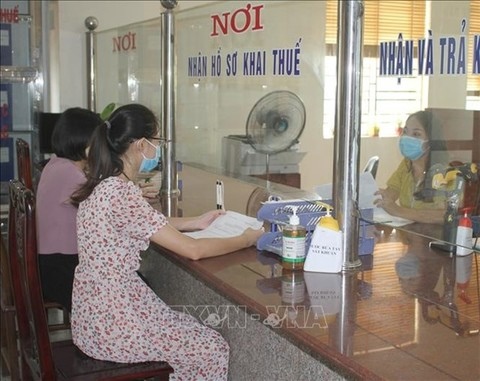Ministry proposes tax filing deadline extension for 2024
Ministry proposes tax filing deadline extension for 2024
The Ministry of Finance (MoF) is considering proposals from other relevant ministries and agencies on a draft decree that would extend the deadlines for filing taxes.

Citizens at the tax office. — VNA/VNS Photo |
The Ministry of Justice will evaluate the draft before submitting it to the Government in May.
The aim is to continue easing difficulties and providing support for business operations.
Previously, the MoF reported that an official dispatch had been sent to the Prime Minister, seeking approval to develop a decree extending the deadlines for submitting value-added tax, corporate income tax, personal income tax and land rental fee payments for the current year.
The ministry also suggested extending the deadline for submitting a special consumption tax for domestically manufactured or assembled automobiles. The proposed decree will be fast tracked if approved.
The Government office has released documents saying Deputy Prime Minister Lê Minh Khái would approve such a proposal.
A report regarding the outcomes of implementing the 2 per cent reduction in the value-added tax (VAT) rate, as stated in Resolution No. 110, was also recently handed to the National Assembly.
The report showed that in the first quarter of this year, the VAT reduction resulted in a tax saving of nearly VNĐ11.5 trillion.
Except for February, due to the Tết holiday, the average monthly reduction in value-added tax for imports was approximately VNĐ1.5 trillion, while the domestic sector saw a monthly reduction of about VNĐ2.5 trillion in January and March.
As a result, the budget revenue has decreased by nearly VNĐ23.5 trillion so far this year.
If the policy of VAT cut continues for the second half of the year, it is projected that the total tax reduction for the year will reach approximately VNĐ47.5 trillion.
The Government said that the resolute and coordinated implementation of financial measures recently has positively impacted businesses and stabilising production, business activities and people's livelihoods, thereby contributing to macro-economic stability and creating favourable conditions for economic recovery and growth.




























